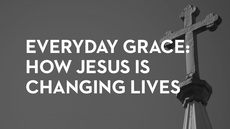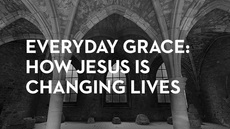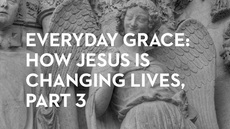That which was from the beginning, which we have heard, which we have seen with our eyes, which we looked upon and have touched with our hands, concerning the word of life—the life was made manifest, and we have seen it, and testify to it and proclaim to you the eternal life, which was with the Father and was made manifest to us—that which we have seen and heard we proclaim also to you, so that you too may have fellowship with us; and indeed our fellowship is with the Father and with his Son Jesus Christ. And we are writing these things so that our joy may be complete.
In the Gospel of John, Jesus declared to a crowd, “Truly, truly, I say to you, before Abraham was, I am” (John 8:58). At this, the crowd began throwing stones at him. By uttering the phrase “I am,” Jesus was putting himself on equal footing with God (a.k.a., the great “I Am”), and this was blasphemy—a crime punishable by death (Lev. 24:16).
When our first parents sinned in the garden, they “hid themselves from the presence of the Lord God” (Gen. 3:8). After this initial sin, humanity was forced apart from God. The Old Testament paints a clear picture of a fence around God’s name and glory; in Exodus 33:20, God tells Moses “you cannot see my face, for man shall not see me and live.” In Deuteronomy, after receiving the Ten Commandments, the people ask Moses to hear from God on their behalf, out of fear of his glory, saying, “This day we have seen God speak with man, and man still live. . . . If we hear the voice of the Lord our God any more, we shall die. For who is there of all flesh, that has heard the voice of the living God speaking out of the fire as we have, and has still lived?” (Deut. 5:22–27).
Yet this God, whom no one could look on and live, became flesh. Philippians 2:6–7 says Jesus, who is God, “emptied himself . . . being born in the likeness of men.” To the Jews of Jesus’ day, this was unbelievable. That the God of all glory would save his people in such a humble way was beyond comprehension (Isa. 53:3; Matt. 13:53–58; John 1:10–11).
Not only did God become flesh, he chose eyewitnesses to this amazing salvation story. The book of 1 John opens with the exclamations of an eyewitness to the incredible event of the Incarnation, God come in flesh. The author of this letter was able to do what no human had done—stand in the presence of God and live. He describes this in John 1:14: “And the Word became flesh and dwelt among us, and we have seen his glory, glory as of the only Son from the Father, full of grace and truth.”
The incarnation restores fellowship, for “no one has ever seen God; the only God, who is at the Father’s side, he has made him known” (John 1:18). And the joy of the presence of God is the ultimate restoration (1 John 1:4).
Observation
- What, according to John, was from the beginning?
- What was “made manifest” and to whom was it manifested?
- List the ways John has experienced “the word of life.”
- What does the author “proclaim” and “testify” about?
- Who is John’s fellowship with?
- How will the apostle’s joy be completed?
This devotion is adapted from the 1 John Study Guide. Pick up a copy today for only $9.99. The study guide includes 13-week curriculum with small group studies and group inductive studies.















